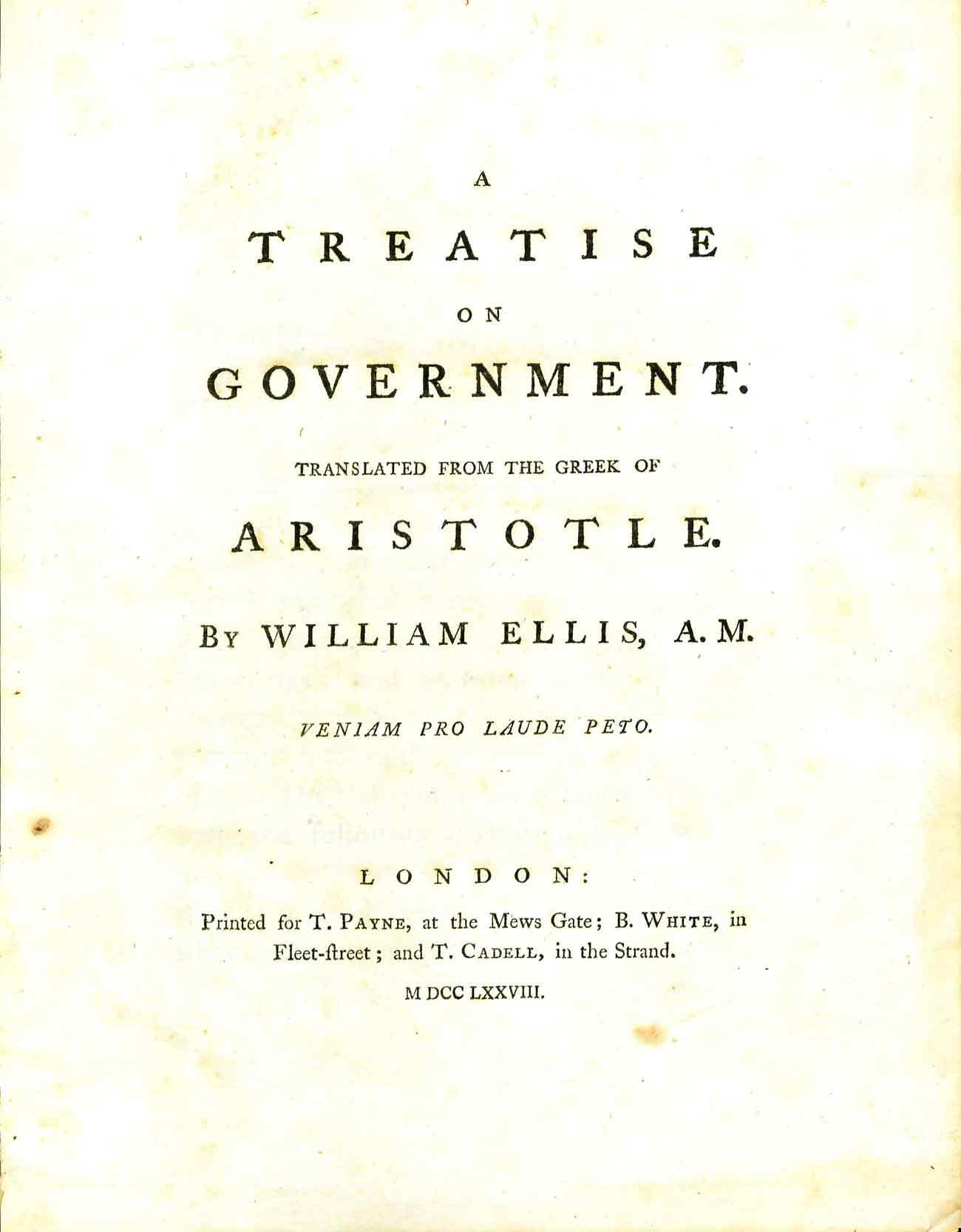A Treatise on Government
by Aristotle
| A Treatise on Government | |
|
Title page from A Treatise on Government, George Wythe Collection, Wolf Law Library, College of William & Mary. | |
| Author | Aristotle |
| Translator | William Ellis |
| Published | London: T. Payne |
| Date | 1778 |
| Language | English |
| Pages | 428 |
| Desc. | (28 cm.) |
| Location | Shelf E-1 |
Aristotle (384 – 322 BCE) was a philosopher in ancient Greece.[1] He studied at Plato's Academy, and later became tutor to Alexander the Great.[2] Aristotle's work in A Treatise on Government would be a fundamental philosophical text for anyone interested in the history of political discussion and the merits of various forms of government. Aristotle diverges from Plato and establishes his own theories of human interaction—a perspective that differs from social contract theory on why cities and political entities are formed.[3] This would prove very useful in eighteenth century political debates about the formation of the United States.[4]
First published in 1776, William Ellis's translation of Aristotle's Politics was the first English version to appear since 1597, and the first to be translated directly from the Greek.
Evidence for Inclusion in Wythe's Library
George Wythe refers to Aristotle in two of his case reports: Field v. Harrison, "these sentences are called authorities, and are so respected that when a thing is said to be just or unjust, the speaker, who is required to prove it, in like manner as some men, not long ago, thought nothing necessary to prove a physical truth more than to shew that it had been affirmed by Aristotle, somewhere or other in his works...."[5] and Overton v. Ross, "Did Aristotle, Ramus, Milton, Duncan, &c in their dialectic institutions, teach their disciples that in a syllogism the minor proposition, as is done here by these words, 'the present case is that of no date to the bond,' may be taken for granted."[6] We do not have enough information to verify if Wythe owned any works by Aristotle or what those works may have been. Brown suggests two titles, Dn. Ioannis Magiri, Philosophiæ Professoris in Academia Marpvrgensi Inclyti Corona Virtutum Moralium, Universam Aristotelis Svmmi Philosophi Ethicen Exacte Enucleans (1614) or A Treatise on Government. Translated from the Greek of Aristotle (1778) based on copies Thomas Jefferson sold to the Library of Congress.[7] The Wolf Law Library purchased the 1778 English title.
Description of the Wolf Law Library's copy
Bound in contemporary speckled calf bordered with single gilt fillet, spine elaborately gilt in compartments between raised bands, red morocco label lettered in gilt. Purchased from Abelard Books.
Images of the library's copy of this book are available on Flickr. View the record for this book in William & Mary's online catalog.
Full text
- A Treatise on Government (17MB PDF)
See also
References
- ↑ Stanford Encyclopedia of Philosophy, s.v. "Aristotle's Political Theory," accessed October 3, 2013.
- ↑ Ibid.
- ↑ "Politics by Aristotle: Book 3", no date posted.
- ↑ Internet Encyclopedia of Philosophy, s.v. "American Philosophy," accessed October 4, 2013.
- ↑ George Wythe, "Report of the Case Between Field and Harrison, Determined by the High Court of Chancery in which the Decree was Reversed by the Court of Appeals" (Richmond: Printed and Sold by Thomas Nicolson, 1796), 19 n.
- ↑ George Wythe, "The Case of Overtons Mill: Prolegomena, in the Richmond Common-Law District Court, Elizabeth Overton and Richard Overton, plaintiffs, against David Ross, defendent" (Richmond, VA?: s.n., 1803?), 5.
- ↑ E. Millicent Sowerby, Catalogue of the Library of Thomas Jefferson, (Washington, D.C.: The Library of Congress, 1952-1959), 2:32, [no.1308] and 3:24 [no.2357].
